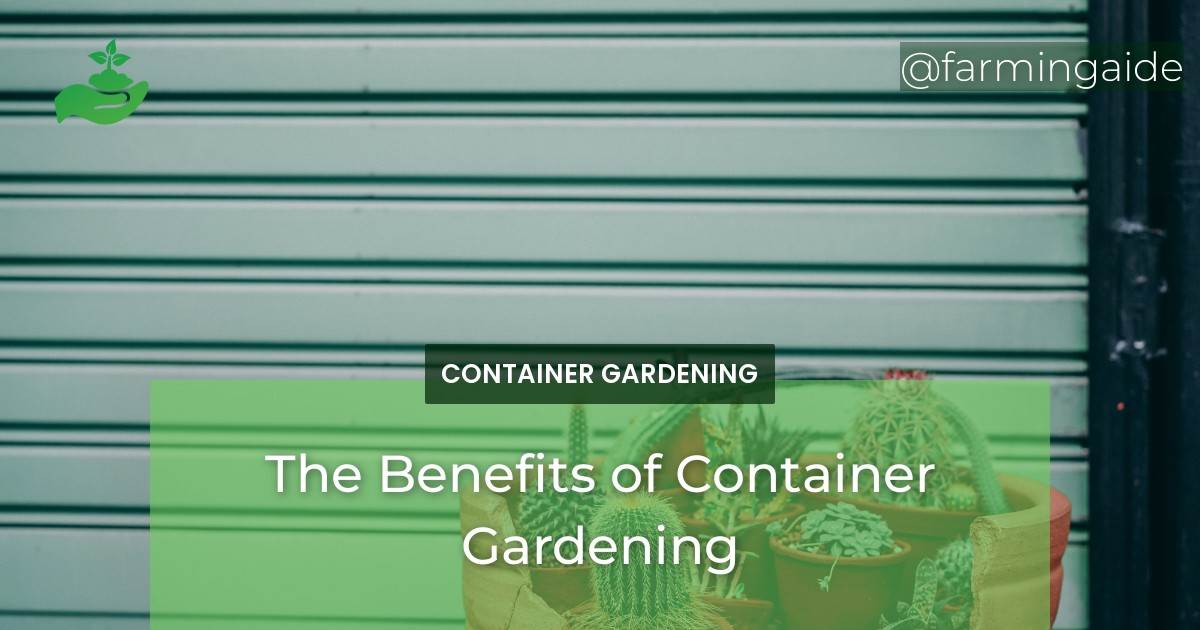Container gardening is a popular option for those who love plants but have limited outdoor space. This type of gardening involves growing plants in containers such as pots, buckets, or raised beds. However, container gardening is not just for those who lack space. It offers many benefits that traditional gardening cannot provide.
In this article, we will explore the benefits of container gardening, the different types of containers available, how to choose the right plants, and techniques for successful gardening.
Table of Contents
Advantages of Container Gardening
Flexibility
One of the most significant advantages of container gardening is its flexibility. Container gardens can be placed almost anywhere, from balconies to walkways to patios. You can move them around to take advantage of different sunlight levels or to create an aesthetically pleasing arrangement. Container gardens also allow gardeners to experiment with different plant varieties without committing to a long-term planting.
Portability
Container gardens are portable, meaning that they can be easily moved to different locations around your home or yard. This flexibility allows you to protect your plants from harsh weather conditions or pests, or to move them to better sunlight exposure. Additionally, container gardens are perfect for those who rent, as they can be easily transported when moving to a new home.
Ability to Control Soil and Sunlight Exposure
Container gardening also provides the ability to control soil and sunlight exposure. By planting in containers, you can choose the type of soil and create an ideal growing environment for your plants. Additionally, you can move your containers to take advantage of the ideal light requirements for your plants.
ALSO READ
Choosing Containers for Your Garden
Types of Containers
There are many types of containers available for container gardening, ranging from pots to hanging baskets to raised beds. When selecting a container, consider the size of the plant you want to grow, the style of your garden, and the amount of space you have available. It’s important to choose a container that will provide adequate drainage and support for your plants.
Size and Shape of Containers
The size and shape of your container will depend on the type of plant you want to grow. For instance, larger plants, such as tomatoes or peppers, require larger containers than small plants like herbs or flowers. Additionally, the shape of your container should be considered. For example, shallow containers are ideal for plants with shallow roots, while deeper containers are better for plants with deeper roots.
Materials
Containers can be made from a variety of materials, including plastic, clay, metal, or wood. Each material has its own advantages and disadvantages. Plastic containers are lightweight and inexpensive, while clay pots are porous and allow air circulation. Metal containers are durable and long-lasting, while wooden containers are sturdy and provide good insulation.
Selecting Plants for Container Gardening
Best Plants for Container Gardening
Almost any plant can be grown in a container, but some are better suited than others. When selecting plants for container gardening, consider the height and width of the mature plant, the amount of sunlight required, and the space you have available. Some popular plants for container gardening include herbs, tomatoes, peppers, and flowers.
Soil and Fertilizer Requirements
Selecting the right soil and fertilizer is essential for container gardening success. Potting soil is ideal for container gardens, as it contains the necessary nutrients and drainage for healthy plant growth. Fertilizers should be applied regularly to ensure healthy plant growth.
ALSO READ
Container Gardening Techniques
Watering and Drainage
Proper watering and drainage are crucial for container gardening success. Containers should have drainage holes to prevent water from pooling at the bottom, which can lead to root rot. It’s essential to water container plants regularly, especially during hot weather.
Pruning and Deadheading
Pruning and deadheading are necessary for maintaining healthy container plants. Deadheading, or removing spent blooms, encourages new growth and prolongs the blooming period. Pruning can help control the size and shape of your plants, promoting new growth.
Pest and Disease Control
Pest and disease control are also important for container gardening success. Regularly inspect your plants for signs of pests or diseases, and take appropriate action to prevent their spread. This may include using natural pest control methods or applying pesticides.
Tips for Successful Container Gardening
Placement and Sunlight
Proper placement and sunlight are crucial for container gardening success. Most container plants require at least six hours of sunlight per day, so place your containers in areas that receive adequate sunlight.
Choosing the Right Soil
Choosing the right soil is essential for container gardening success. Potting soil is ideal for container gardens, as it contains the necessary nutrients and drainage for healthy plant growth.
Consistent Maintenance
Consistent maintenance is necessary for container gardening success. This includes watering, fertilizing, pruning, and pest control. Regularly inspect your plants for signs of stress, and take appropriate action to prevent further damage.
How Does Container Gardening Compare to Using Raised Containers for Gardening?
Container gardening offers the convenience of growing plants in any container, but the benefits of raised containers include better drainage, fewer weeds, and less strain on the back. Raised containers also provide better aeration and easier maintenance, making them a popular choice for many gardeners.
Conclusion
Container gardening offers many advantages over traditional gardening. With its flexibility, portability, and ability to control soil and sunlight exposure, container gardening is an excellent option for those with limited outdoor space or those who want to experiment with different plant varieties. By choosing the right containers, plants, and techniques, you can create a beautiful and thriving container garden that will provide you with fresh herbs, vegetables, and flowers all season long.
RELATED ARTICLES:


